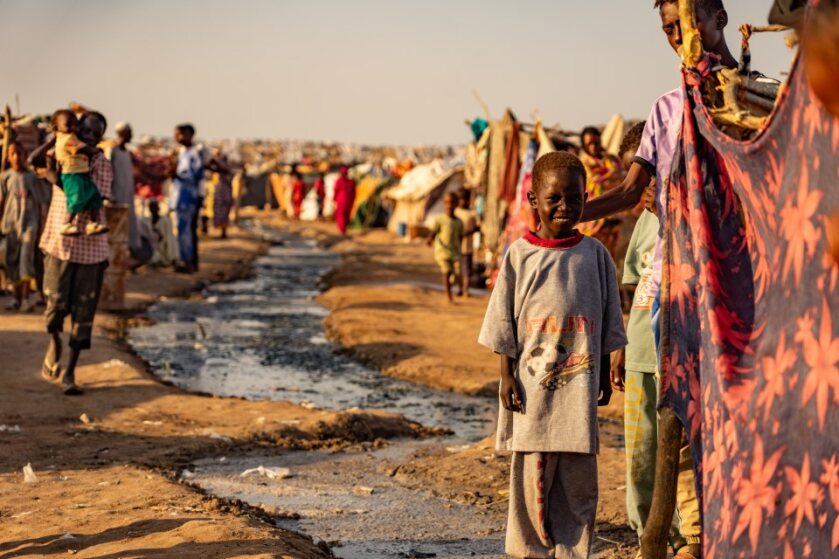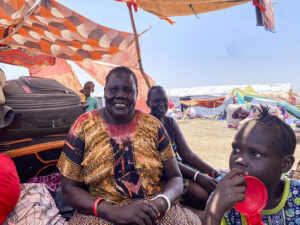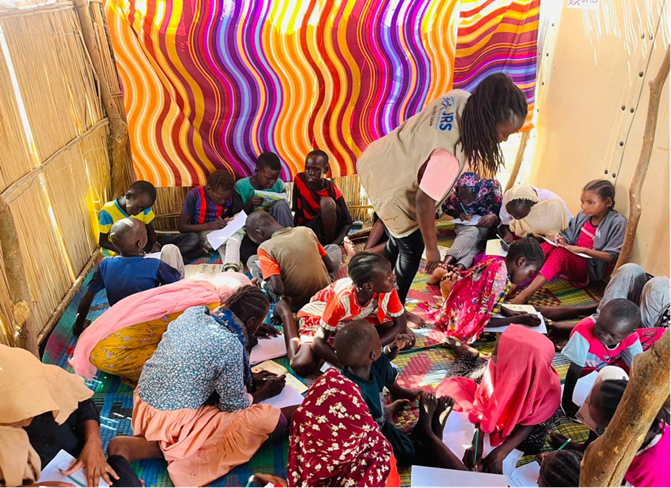
This week we have been sharing stories from people facing the unimaginable.
Without YOUR help, supporting the lives of brave and resilient mothers, fathers and families couldn’t be possible as they take refuge in camps and refugee settlements at the border of South Sudan after long and perilous journeys.
 Dyck (70), a family matriarch, shares her story of barricading her own home when war broke out in Khartoum and escaping with her children and grandchildren when violence paused for a single crucial moment.
Dyck (70), a family matriarch, shares her story of barricading her own home when war broke out in Khartoum and escaping with her children and grandchildren when violence paused for a single crucial moment.
When asked about her journey, Dyck explains: “It was harsh…. We got tired, the climate was harsh and we were being stopped by the military often to check where we were going, what were we carrying…”
The Sudan war has led to a massive humanitarian crisis as families, like Dyck’s, have been forced to flea bombings across the country.
Today, we share updates from our partners the Jesuit Refugee Service (JRS) highlighting their crucial humanitarian work at the frontiers of war and violence meeting and accompanying families, like Dyck’s, who are brave survivors.
This post is spotlighting lifesaving work that couldn’t be possible without YOUR support
Since the start of the conflict in Sudan, the largest numbers of civilians have been forced to escape south into South Sudan, including people who were already internally displaced there and refugees from other countries who had previously sought safety in Sudan.
Renk is a border crossing between Sudan and South Sudan, it acts as a transit centre and camp for those lucky enough to escape the violence.
As of 2nd June 2024, 697,917 people have arrived in South Sudan with 6,051 individuals arriving in these past weeks.
JRS is the sole provider of physiotherapy and Psychosocial support services to a population of over 30,000 people needing these critical services.
In 2024 alone, JRS has served 4,538 (2,540 female and 1,998 male) individuals under the rehabilitation and PSS programs.
As well as supporting refugees with counseling and physiotherapy, food aid and non-food items for the extremely vulnerable such as the sick, elderly and child headed households have been provided. This aid includes beans, cooking oil, sorghum flour and sugar. They are also given soap and at times kitchen items like plates and cups.
 JRS started education support in January 2024 in Renk.
JRS started education support in January 2024 in Renk.
The services include payment incentives to teachers in 3 primary schools within Renk, a 3 months’ English literacy program currently targeting 42 teachers and recreational activities for school going children currently targeting 200 children within the transit and extension centers.
Although safe from violent militia, refugees in Renk still face many challenges. The long rainy season has started and is expected to continue for the next 3 months.
Due to poor drainage system in transit center 1, the returnees and asylum seekers have been exposed to water borne diseases like diarrhea, while the overcrowded conditions have also made it easy for the infectious diseases to spread.
UNHCR in collaboration with the local government opened an extension center within Renk on January 2nd, 2024, to alleviate overcrowding in the Transit Center 1. Despite its intended capacity of approximately 2,100 people, it currently shelters more than 23,000 individuals. These returnees urgently require essential aid, including food, health services, and water.
The communities living in both transit centers are also in need of mosquito nets and plastic sheets due to the harsh weather conditions.
Despite the challenges, JRS are bringing hope to communities feeling hopeless and forgotten and providing life-saving aid to the world’s most vulnerable right now.
For World Refugee Week we will continue to share refugee stories giving voice to those suffering in a forgotten humanitarian crisis and our message is one of solidarity for all refugees near and far.
You can help us support refugees experiencing the unimaginable by donating or sharing their stories today.


